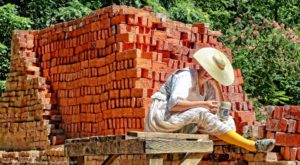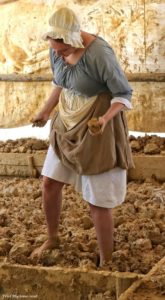 In Spring 2018, I decided to create my own internship, which involved returning to my usual summer job working in the brickyard at Colonial Williamsburg. This has been my summer job since 2016, but I have spent every summer, and sometimes all year, in Colonial Williamsburg since I was nine years old. This internship was a unique opportunity for me because I was able to research something that has always intrigued me–women in the artisanal trades.
In Spring 2018, I decided to create my own internship, which involved returning to my usual summer job working in the brickyard at Colonial Williamsburg. This has been my summer job since 2016, but I have spent every summer, and sometimes all year, in Colonial Williamsburg since I was nine years old. This internship was a unique opportunity for me because I was able to research something that has always intrigued me–women in the artisanal trades.
Each summer, I received the same questions or comments about a woman working in brick making: “Oh, you can’t lift those bricks” or “You should be cooking in a kitchen!” People were shocked that women worked in trades, especially one that is so labor intensive. Brick-making involves digging up natural clay from a local source, treading in the clay with your bare feet, molding the clay into a two-brick mold, setting them out in the sun to dry, moving them un der a waterproof cover, and then firing all of them at once in November. This is not a hard trade to learn, but it is a hard trade to get used to.
der a waterproof cover, and then firing all of them at once in November. This is not a hard trade to learn, but it is a hard trade to get used to.
These questions and comments were frustrating, and I wanted to find solid evidence that I could use to answer these questions. Creating an internship was an easy way to address these issues. I asked my major supervisor, Dr. Moon, to look over my work and my job supervisor to approve my hours, along with providing me with time to research. Every week, I spent my Monday mornings visiting with other women working in trades at Colonial Williamsburg, discussing the research they had done, and looking at their resources. After researching, I wrote up a journal entry about what I had found and sent it to Dr. Moon. At the end of my internship, I had found information about a few different women in trades and wrote a long reflection paper about the experience and the information I had found. I also discovered several women working in trades around the Chesapeake Bay Region during the colonial period who were trailblazers for change and empowerment.
The information that I found during this internship helped at work because I was able to answer questions about women working in eighteenth-century Williamsburg, and my coworkers often turned to me to answer these questions since I had done the research. I loved this experience and I loved being able to bring an educational aspect to my job. Working in a brickyard is tough, but so very rewarding especially when you can change people’s minds about women working in trades that we usually believe are male-dominated.
